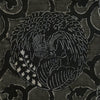Katazome
Katazome is a resist dye technique in which a paste of rice flour and bran is applied to cloth through a cut paper stencil. This paste is applied with a flat, blunt tool or a brush: where the paste has been pushed onto the cloth, dye will not penetrate. Dyes can be applied using an immersion method, by hand tinting, or by a combination of these applications, depending on the complexity of the desired effect. If the cloth is to be seen from both sides, the application of rice paste through a stencil is applied to both sides of a cloth, requiring an amazing technical skill for exact registration of the stencil on front and back.
A Length of Taisho Sarasa: Distinctive Cloth from the 1920s and 30s
early twentieth century43" x 14", 109 cm x 35.5 cm Throug... (more)
A Length of Mottled Katazome Dyed Cotton: Cranes and Tortoises
late nineteenth century40" x 13 1/2", 101.5 cm x 34 cm Th... (more)
A Pieced Mat of Katazome Dyed Cotton: Tatewaku and Butterflies
late nineteenth, early twentieth century62 1/4" x 24 1/2"... (more)
A Faded and Folded Length of Katazome Dyed Cotton: Realistic Woodgrain
early twentieth century70" x 13 1/2", 178 cm x 34 cm This... (more)
A Length of Jishiro or Blue-on-White Narumi Kongata Cloth: Plovers
late nineteenth, early twentieth century45" x 13 1/2", 11... (more)
A Length of Katazome Cotton: Folding Fans
late nineteenth, early twentieth century36 1/2" x 12 1/2"... (more)
A Fragment of Dark Toned Katazome: Phoenixes as Roundels
late nineteenth, early twentieth century22" x 13 1/4", 56... (more)
A Two Panel Fragment Taken from a Kyogen Costume: Resist Dyed Hemp Cloth
early twentieth century34 1/4" x 31", 87 cm x 79 cm This ... (more)








